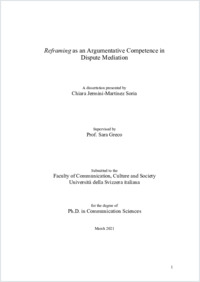Reframing as an argumentative competence in dispute mediation
- Jermini-Martinez Soria, Chiara
- Greco, Sara (Degree supervisor)
-
24.06.2021
210
Thèse de doctorat: Università della Svizzera italiana, 2021 (jury note: Magna cum laude)
Conflict resolution
Dispute mediation
Reframing
Argumentation
Pragma-dialectics
AMT (Argumentum Model of Topics)
Discourse analysis
English
Dispute mediation is a dialogical and communicative process in which a neutral third party, a mediator, helps conflicting parties modifying the way in which they interact with each other so that they become able to co-construct a solution to their conflict that is mutually satisfactory. Mediators cannot impose solutions to the parties, yet they play a fundamental role in conflict resolutions as they enable people to be in the right mindset to explore options for win-win solutions by themselves. Mediators are able to perform this task employing different techniques; it has been observed several times, both in scientific research and in professional practice, that reframing is an important communicative competence of mediators (see e.g. Donohue, Allen and Burrell, 1988). However, research has not elicited yet how reframing actually works, i.e. what a mediator should – or should not – say in order to do a reframing. The research project RefraMe, within which this dissertation is written, tries to fill this gap. The RefraMe projects’ team members started studying reframing after having made the assumption that reframing has an inferential dynamic: when a mediator asks conflicting parties to leave behind their interpretation of the conflict (or of parts of it), s/he is asking them to make an inference; and therefore s/he must provide them with elements (arguments) to reason in a specific way. In other words, the changes in interpretation mediators implicitly propose should be justified through argumentation, otherwise parties would not likely change their minds. From a methodological point of view, I coded two corpora of mediation sessions’ transcriptions identifying reframing instances starting from Putnam’s definition of reframing as shifts in levels of abstraction (Putnam, 2004). This brought an interesting result, namely it showed the presence of “new” types of shifts in levels of abstraction (that Putnam does not mention in her work) in the reframing analyzed. Secondly, I analysed them employing two complementary theoretical frameworks: the AMT model (Rigotti and Greco, 2019), that allows for a fine-grained analysis of argumentation schemes, and the Pragma-dialectical model of a critical discussion (van Eemeren and Grootendorst, 2004), in particular its notion of strategic maneuvering (van Eemeren, 2010), as we view reframing as part of a mediators’ strategic maneuvering. This analysis allowed me to find out that argumentation plays different roles in different reframing instances: eventually, I discovered that the term reframing – as it is defined in this work – covers in fact four different phenomena that have different functions in the mediation process. Moreover, I also annotated the corpora with the software UAM Corpus Tool, that allows for a manual and multilayer annotation of texts: this made it possible for me to discuss which features of reframing (in terms of AMT and/or pragma- dialectical analysis) are the more recurrent ones and to hypothesize why that is the case.
- Language
-
- English
- Classification
- Social sciences
- License
-
License undefined
- Identifiers
-
- RERO DOC 330915
- URN urn:nbn:ch:rero-006-119434
- ARK ark:/12658/srd1319195
- Persistent URL
- https://n2t.net/ark:/12658/srd1319195
Statistics
Document views: 656
File downloads:
- Texte intégral: 873
